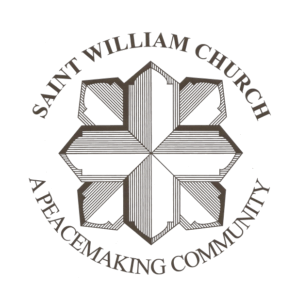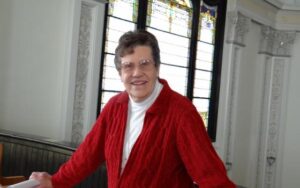Women Deacons Revisited

Women Deacons Revisited
by Anthony Gooley
In an interview with the 60 Minutes which aired on CBS T.V. on May 20, 2024, in the USA, Pope Francis expressed a clear no to the possibility of ordaining women as deacons. It is worth exploring what he said and the implications of what he said given that we had two articles on this topic in the last newsletter.
The transcript of the portion of the interview dealing with the possibility of ordaining women, as reported in the magazine American Magazine, is provided below.
“I’m curious, for a little girl growing up Catholic today, will she ever have the opportunity to be a deacon and participate as a clergy member in the church?” interviewer Norah O’Donnell asked the pope.
“No,” he replied.
Pushing for clarification, Ms. O’Donnell responded: “I understand you have said no to women as priests, but you are studying the idea of women as deacons. Is that something you’re open to?”
Francis elaborated: “If it is deacons with Holy Orders, no. But women have always had, I would say, the function of deaconesses without being deacons, right? Women are of great service as women, not as ministers, as ministers in this regard, within the Holy Orders.”
The interviewer continues to note that the pope has had two commissions looking at this question of women deacons. It is also worth noting that at the close of the first part of the Synod on Synodality that one of the study groups has been tasked with exploring, “Some theological and canonical questions about specific ministerial forms,” which includes “the question of women’s possible access to the diaconate.” That study group is to report back at the next session of the Synod on Synodality.
Context
Before we address the points, his response raises, we need some context. Pope Francis is expressing a private opinion as a Catholic and as a Catholic bishop. A bishop who also happens to be head of the episcopal college, a college which according to Councils Vatican I and II, is the supreme authority in the Catholic Church. A T.V. interview is not an official teaching act and has no theological status other than that of an episcopal opinion. He is being asked what he is open to not what the Catholic Church is open to on this question or is likely to believe and teach on this topic. Other bishops in the College, members of the Synod on Synodality and, theologians may have a range of views on this subject. Let’s not make it more than it is.
In the view of Bishop Francis of Rome, he believes that he must say no to an ordained ministry for women in the Catholic Church. He sees no possibility for women as presbyters, deacons, or bishops in the Catholic Church. As I mention in my book Deacons Today, the teaching issued by John Paul II, that the Catholic Church has no authority to ordain women as priests (which includes presbyters and bishops who both have a sacerdotal/priestly function) applies only to the possibility of presbyteral and episcopal ordination. That this teaching is to be definitively held closes this question after two thousand years of consideration. I am not convinced that such a teaching is infallible, even though the Congregation (now Dicastery) for Doctrine ruled that it is. A CDF ruling does not make it infallible; it must be manifestly so. In any case, infallible or not, it must be given the ascent of intellect and will. In the mind of Pope Francis this teaching also applies to women as deacons, even though that question was not considered by John Paul II.
A non-sacramental diaconate?
Is Pope Francis saying yes to the possibility of a non-sacramental diaconate for women? If this is so it would mark a genuine innovation and departure from the Tradition. It would be a genuine innovation to have an ordained ministry of deacon, for men, alongside of a non-ordained diaconate of women. We have never had a situation in which we had a parallel of an ordained order with a non-ordained. This is hugely problematic. Does it open the way for a non-ordained and ordained presbyterate and episcopate? Why could we have two forms of diaconate without two forms of the other orders? How would this be justified theologically? The doctrinal implications for understanding Holy Orders are profound.
There is an even more significant hurdle with the proposal for an ordained and non-ordained diaconate because we know the Tradition includes an ordained diaconate of women from at least the fourth until the twelfth century and the preservation of rites of ordination for women after this period. We should not forget the canonical tradition dealing with women deacons and their place as clergy in the Church and civil society. His proposal would ignore all that evidence.
In other words, this proposed innovation of Pope Francis would require far greater justification and theological argument to support such a move than the restoration of the ministry of women deacons among the ranks of the ordained clergy. Such a proposal opens far more doctrinal, theological, and canonical difficulties than restoration of the women’s diaconate in accordance with ancient tradition.
Functionalist understanding
He is anticipating agreement with his statement, “But women have always had, I would say, the function of deaconesses without being deacons, right?”, but I and many others would disagree. His language betrays his functionalist understanding of ministry. We don’t work out what a presbyter or bishop is by looking at the tasks he performs, his functions, to determine what he is. For when a man ceases to exercise an active ministry of presbyter or bishop, he does not cease to be a presbyter or bishop. Who he is by the grace of ordination and not what he does that allows us to understand his ministry. What he does flows from what he is. It is the same for deacons.
It would have been illuminating for the interviewer to press Francis on what functions he was referring to those of a ‘deaconess’. Catholic theology has avoided, for the most part, a functionalist theology of Holy Orders and ministry generally. His language is at least consistent. He has had a functionalist understanding of the diaconate for men and for women since his days as Archbishop of Buenos Aires, if not before. He refused to accept men for the diaconate because they were already doing ‘diaconal things’. At the Synod on the Amazon, he asked why women needed to be ordained when they were already doing ‘diaconal things’. What are diaconal things, presbyteral things, and episcopal things? I would reject Pope Francis’ functionalist understanding of Holy Orders as not being consistent with Catholic doctrine.
I have heard Pope Francis speak about deacons and he adopts the view that the ministry of deacons is that of service to the poor and works of charity. This I imagine he may include in his idea of functions. That such service characterizes the ministry of deacons is deeply, and widely held by many in the Catholic Church. It is the standard theology of Protestant diaconate. Although such a view of the diaconate is deeply and widely entrenched, it is not an argument in favour of the view. That would be to commit the fallacy of reasoning which is to appeal to the majority. That the service of the poor is the defining mark of diaconal ministry is manifestly false and based upon a mistaken identification of the diakon words in Koine Greek with the words for charity. John N. Collins revealed this in his landmark work, Diakonia: Reinterpreting the Ancient Sources. I have developed some of the implications of this in my book, Deacons Today. We always need to keep in mind that the Koine Greek diakon word group give us our English words, ‘minister’, ‘ministry’, ‘to minister’, ‘ministrations,’ and the loan word ‘deacon’. Lumen gentium simply describes the ministry of the bishop as a diaconía. So, if we want to argue that the diaconate is especially focused on charity to the poor then so too is all ministry because they come from the same root.
Even the pope’s language about women and ‘service’ and ‘ministry’ are confused terms. He seems to be conflating Holy Orders with ministry by implication, when he says, “great service as women, not as ministers, as ministers in this regard, within the Holy Orders.” Service is a ministry word. The diakon words which give us all our ministry words in English, concern service a person performs on behalf of another, or commissioned service. The one who is being served is not the recipient of the service but the one who commissioned the service. In Mark 10:45 Jesus comes to serve the Father, by giving his life as a ransom for many. The one being served is the Father and how that services is accomplished is by giving of his life for many. An ordained minister is serving Christ who sent him, not the community which receives his ministry. Both of the service words in Mark 10:45 are diakon words and imply no charitable service, no benevolent care or concern for another. The pope’s use of service seems once again to hark back to a function someone does for another, not on behalf of another.
The Tradition of women deacons
There have been ordained women deacons in the Church up until and after the Great Schism of 1054. These are not to be confused with deaconess’ who were the wives of deacons. These women deacons were deacons because they had the grace of ordination just as the men deacons did. So, Francis is wrong, there have never been deaconess’ doing diaconal things and there have not been women deacons who were not ordained. Ordination is a sacramental grace identified by the Church as part of her essence, her constitution which comes from Christ, as defined at the Council of Trent, and received and extended at Second Vatican Council.
In chapter six of my book, I touch on a small slice of the great deal of evidence that exists and which point us toward an ordained diaconate of women. Howsoever the sacrament of Holy Orders was understood in these sources, the same rites, the same laws and the same kinds of functions and relationship to the bishop are applied to women and men. We cannot use these sources to support the ordination of male deacons and to deny women’s ordination. This is especially the case in the well-known Apostolic Constitutions (of Egypt) that contain ordination rituals for women and men deacon, including them among the ordained ministry of bishop. This same document makes clear that there was no tradition yet of an ordained presbyterate. That would develop later. The weight of the sources supports a very early understanding of an ordained and therefore sacramental diaconate of women and men.
Who or what is a cleric?
The interview made me call to mind another statement Francis consistently makes for not ordaining men or women deacons. It is a curious phrase, “I don’t want to clericalize the laity.” It is as if presbyters and bishops were always an ordained caste, and never laity. It is such an odd phrase whose meaning is hard to decipher. Pope Francis was ordained a deacon in 1968 but that was not when he became a cleric. Jorge Bergoglio, like all men being formed for the priesthood at that time, became a cleric while still a lay man. Up until Paul VI issued Ministeria Quaedam in 1973, men became clerics when they received first tonsure before they were installed as lectors. At that point they were bound by the obligations and had the rights of clerics in the Church. We used to clericalize the laity and then we stopped in 1973. Now a man becomes a cleric when he is ordained as a deacon, as was the practice of the Church before the twelfth century.
Prior to the twelfth century women and men were listed among the clergy in a variety of canons passed by regional and local councils. The women clergy were deacons. There is a canonical tradition which sets out the rights and obligations of women deacons as clergy extending from the fourth to the twelfth centuries. Clergy had both civil and church obligations and rights. From the twelfth century we have a canonical tradition in many jurisdictions whereby students who are enrolled in a degree of theology, which was only available at masters’ level, were enrolled as clerics. In some dioceses local canon law also included students of canon law and canon lawyers among clerics. They were lay people clerics, unless they were ordained. The tradition of listing students as clerics ended after the fifteenth century in most places. What we mean by clergy has not had a stable meaning throughout Catholic history.
Weighing private thoughts
As I mentioned earlier what Francis has said is only the private opinion of a Catholic who is also a bishop. The Bishop of Rome is also the Pope. Throughout the twentieth century popes have had a much more visible presence in the Church and have written and spoken on more issues than popes in all previous twenty centuries combined. An unhealthy tendency has grown in the Church which places too much emphasis on the ordinary teachings of popes and sometimes even basic remarks given at conferences or interviews, lending to them a weight that they do not actually deserve.
Under the current papacy we have witnessed a resurgence in ultramontanism. Ultramontanism is a lay movement which came to dominate the Catholic Church is the late nineteenth century and remained a force throughout the twentieth. It exaggerates the power and authority of popes and minimizes the authority of bishops and councils. Coupled with social media today, ultramontanism, allows the pope’s everyday thoughts to be spread around the world. Popes can seem to take on the role of the world’s teacher and parish priest. We are not experiencing ultramontanism in its strongest form, but it has certainly found a new lease of life.
This leads me to my next point about his interview. What impact might this have on the working group on this question for the Synod on Synodality and for the deliberations of the Synod? Will they consider his comment as more than that of a private opinion and give to his thoughts a weight they do not deserve? Will they be tempted to accept it as an official position or perhaps accept it uncritically, not wanting to be seen as contradicting the pope? Will the Synod members hear the report of the working group and consider the Pope’s comments as just more grist for the mill rather than a teaching of a pope bearing magisterial weight? Will they not consider his private thoughts at all? We still do not have a report of the first two working groups on the question of women and the diaconate. Will the Synod study group have access to these? I have remarked elsewhere, including in my book, that I thought the two commissions were asking the wrong question for investigation and would not be able to bring the real question to a resolution.
Conclusion
I don’t expect people in secular media to report accurately on the Church or the teaching authority of popes. Few, if any, would have any theological knowledge or real understanding of how the teaching authority in the Catholic Church works. Therefore, if a certain amount of exaggerated importance is attached to the pope’s remarks, I am not surprised. My concern is can the Catholic Church resist the form of ultramontanism that is alive in the Church now and only give the weight which is appropriately due to the pope’s comments? They are private remarks. That is all.
The Church still needs an open, public, and robust exchange of ideas on the possibility and desirability of restoring the ordained ministry of women deacons into the life of the Catholic Church. The Synod on Synodality won’t be capable of this kind of robust and open exploration, it is not the nature of such an assembly to do this deep and prolonged theological exchange. The Synod could, however, recommend a process of prolonged exchange of ideas between historians, theologians, and others to help inform the College of Bishops on this important issue for the life of the Church. A series of international and ecumenical dialogues could be held to invite this kind of exchange with a view to collating a public report by 2026 for consideration of episcopal conferences and dicastery’s of the Roman curia. The pope could include his own thoughts in this process as he assists the episcopal college to discern a way forward. It is not his task to substitute for the mind of the Church.
About the Author
Anthony is a theologian and a deacon incardinated in the Archdiocese of Brisbane, living and ministering in the Diocese of Lismore, Australia. He provides a more detailed treatment of women and the diaconate in his book Deacons Today: New Wine, New Wine Skins. Coventry Press: Melbourne. 2020 His latest book is 52 Sundays: A reflective Guide to the Mass. Coventry Press.2024
Editor’s Note
This essay was originally printed in “The Diaconate” The National Association of Deacons of Australia Newsletter. (June 2024, Issue 12) – it is reprinted here with the Author’s permission.


